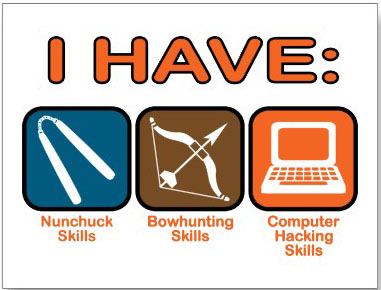 I just finished conducting interviews for an in-house marketing position. Some of the people I interviewed had extensive backgrounds as copywriters and were looking to make career changes.
I just finished conducting interviews for an in-house marketing position. Some of the people I interviewed had extensive backgrounds as copywriters and were looking to make career changes.
I love copywriters and their penchant for huge doses of instant creativity. Unfortunately, the job security of the average copywriter can be shaky because copywriters do not have a monopoly on writing skills within a company. Good writers are found throughout an organization, not just in the copywriter den. This means a surplus of writers who can probably write 80 percent as well as a copywriter without any formal training, in addition to doing their own jobs.
So what happens when cuts need to be made, even though the company still needs copywriting? It becomes very tempting for an organization to let go of copywriters and divide the necessary writing among other capable employees. The final product may not be as good, but the company makes do.
Commoditization Affects All Internet Marketers
A commodity skill is anything that a non-professional feels he can do as well as a professional (notice the role of perception here). It also includes anything that can be moved from being outsourced to in-house without hiring additional staff. Copywriting in this sense becomes commoditized – the career professional’s skill is indifferentiable from the non-professional.
In reality, all internet marketing skills can feel like a commodity at one point or another. I remember hearing about a company who started judging their SEO contractor on a cost-per-link basis: the amount they paid per month divided by the number of links the SEO reported. Of course the SEO could have rigged that metric with directory links and the like, but the client wouldn’t have seen results. To the client, link building was a commodity skill, regardless of what the SEO tried to explain.
Transitioning Industry Demands An Expanding Skill Set
I like Ian Lurie’s list of skills internet marketers should have because it represents a transformation that our entire profession has been seeing over the last several years, not just the copywriters. It is not enough to be copywriter or community manager or customer service specialist. The truth is, people are hiring cheaply for these positions at a time when every dime matters.
Scott Brinker seems equally aware of this transformation as he depicts the marketer of the future as a “marketing technologist,” someone who knows consumer behavior plus how to build the technologies to drive those behaviors. In the future, this will become standard for any advancement-seeking marketers. The message today is either switch or expand your skill set.
Insulation From Marginalization
If you think you may have pigeon-holed your career path or if you’re just concerned with staying marketable, I have a few thoughts:
1. Skill expansion is much easier than a complete career change. Expand into skills that overlap with the things you’re already trained in. If you can’t work out some official cross-training through your employer, you can always find another employee open to a skillshare arrangement.

2. Commoditization decreases as either the technical or data-driven nature of the skill increases. So if you want to develop a skill set that will be in demand, start with skills that normally require a lot of training or that prove their own worth in the form of data. Examples: analytics, online advertising.
3. Don’t be afraid to move beyond what you currently excel at. You’ll always have opportunities to exercise your talents. Just remember that moving away from your core skill will often be met with some resistance from yourself and others.
4. If you’re trying to make a complete career change, don’t brand yourself, resume, website, etc. with the career you’re trying to leave or you may look insincere in your efforts. This was the problem for the copywriters I interviewed (mentioned at the beginning). None of them had made any legitimate effort to prepare themselves for a career change, assuming they really wanted it.
Not everyone wants to be a well-rounded internet marketer, and many have built upon one core skill with relatively few problems up until now. Personally, I know I’d be much less efficient at my own job if I weren’t continually working on peripheral skills that complement SEO. No matter your career ambitions, new skills open many doors that would have otherwise stayed shut.


